Artists of Theory with Soy Panday
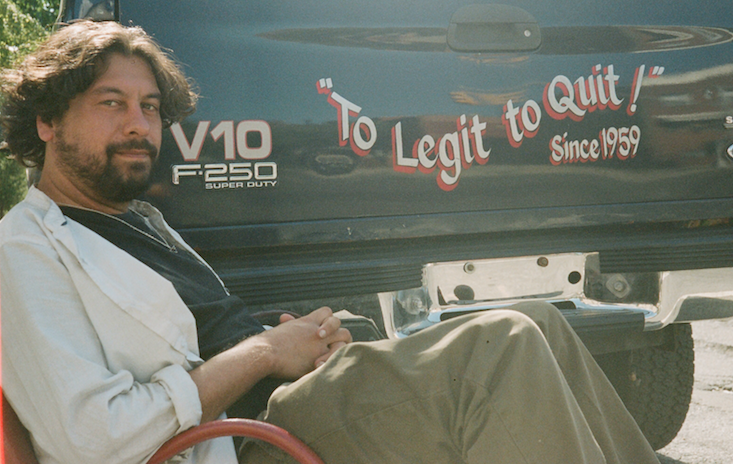
The premise of this interview series is a place for discussion about art and skating with some of today's makers and creators of the visual arts in skateboarding. From images on decks, to photography and in videos - the goal is to give shine to the people that slave away behind desks, pens, brushes, cameras, in darkrooms and behind computers to create visual stimuli that provides stoke, entertainment and style to this thing of ours we call skating. Those central ideas are the heart of this series.
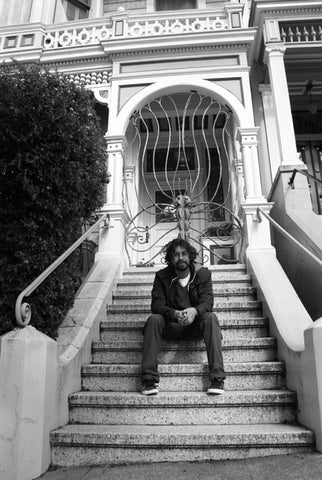
But when you interview a Parisian who is in a self-imposed seclusion in a cabin in the woods in the south of France, things come out a little different. Instead of a casual conversation about those topics mentioned above, it took a different turn. A two and a half hour turn down a path into the metaphysical and subconscious realm of art and how it is a language of its own. One that sparks something in us to buy that board over the others, yet we can only grasp at its meaning in the fleeting moments before we slide it and smudge it into obscurity with cement and fun. Soy's artistic background is different than others, the more traditionally trained makers of images that tend to populate the industry. But when have Soy and the Magenta crew ever conformed to convention? So get ready, buckle up for a glimpse into the creative and complex mind of Mr. Panday.
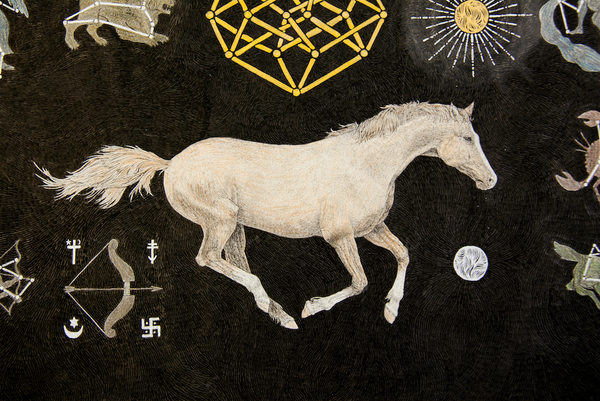
What is your full name and what does it mean?
My full name is Sourya Prakash Panday. Sourya means sun, Prakash means light – so literally it means the light of the sun. My dad thought the sun would be too hot and too hard to handle so he added "light" so it would only be the light of the sun and that would be enough. Panday means Brahman which is the caste of the churchmen, the spiritual leaders, teachers, professors and literate people.
What do you do to pay the bills?
That's a very good question, I can hardly pay my bills! I work for Magenta and four times a year I work for fashion week in Paris. I'm a photographer's assistant, I mainly work on the podium of fashion shows; with those two combined I get by.
Did you start drawing as a child? Or did you find art later in life?
I started very early on I guess. When I was young I was really into comic books. I was drawing a lot, I wanted to be a cartoonist. I was drawing in school, up until I was 18‚ at least until college. I was like, I'll be a cartoonist and go to art school and do this and that. But I started skating at 12 and so from 12 to 18 I spent more time skating than I did drawing. I wanted to apply to this one art school and they were asking for a portfolio which is pretty normal but I was like, "I don't have shit, I've been skating for the past six years. All I have is little drawings in my school books and notes, in the margins. That's all I have, so the portfolio is not happening (laughter). So, fuck, what am I going to do then?" So I went to study Economics for six years in college. Pretty useless shit to be honest. I mean maybe I learned how to write a little bit more, understand a written text a little bit more, but I mean that's about all it gave me, I guess. It gave me some time to skate though.
So during that whole time, I wasn't drawing much. Then Stefan Marx came to Paris to visit Benjamin Deberdt -who I was also good friends with. We were all at his place and started talking and I'm like, "I used to draw too, I really enjoyed that‚" and Stefan was like, "Well that's fine, why don't you pick it up again?‚" He gave me a little sketch book and I was like, "yeah why not.‚" I started getting back into it and started drawing people around me and stuff like that and then slowly I fully got back into it. Thanks Stefan, you're the best!
I once did an internship at Cliche a few years before that, as an intern for international sales. I once suggested that maybe I could try to make some graphics for them and Jeremy was like "yeah, why not?‚" I had never shown him anything, I hardly drew at the time but I was just like maybe that's something I could do, I draw a little bit. But I never did anything, and then I went to go and skate for another company that my friend Samir Krim started, Minutia Skateboards, in France; I left Cliché' and rode for Minutia. That's who I turned pro for. I didn't do any of the graphics for that either. Then I skated for Landscape and did a few graphics for them and maybe that's part of what sparked the idea for Vivien, he saw that I could make a graphic. He was like "So hey, what do you say we start a board company and you draw graphics? We're not doing shit here, we're both living in this apartment, we don't know where we are going, skating for other people's brands and that's it. What's the future looking like, what are we doing?‚" He had just gotten back from a six month trip around Asia and broke up with his girlfriend and stuff like that, he was definitely looking for something to do, like a direction in life and just came up with that. "Let's do this, at least we'll be doing something and if it fails it fails and if it works all the better.‚" And I was like, sure alright let's do it. I'm pretty easy going, if you tell me let's do something, I usually say "sure". Then I don't do much (laughter) because I tend to talk a lot and not do shit (laughter).
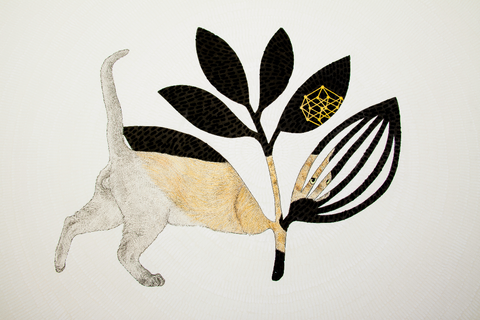

How long ago did the first Magenta board come out?
It's been about seven years, we started working on it in 2009 and the boards came out in the Spring of 2010. I still feel like we're starting you know, it's funny. It's been seven years but we're still kids at it, half of the shit we are doing we don't know how to do it, and like, it's a slow process. I guess maybe that's a good point though, still being a beginner. When you are a beginner, it's the most fun, I remember that's how it is for skating. When I was struggling every day to learn ollies and kickflips as a kid, I was possessed, I couldn't think of anything else. At the time it took a really long time to learn a kickflip actually‚ took me months.
Where are you at right now?
In a cabin in the woods. I have internet but there is not much to do; which is fine, it's great.
That way you stay out of trouble.
Ahah exactly. Away from temptation. I've been wanting to try a fast for a while and really the only way to do it is to get away because otherwise there are too many temptations. When you hang out with friends, you know you're going to do stuff – eat and drink. I wanted to try a five day fast or something like that, and for that you need pretty much ten days to go smoothly in and out of it; you need ten days away from your usual life I guess.
What type of a fast is it? Just water?
It's nothing at all, yes, just water, and one day of dry fasting actually. The two days prior (to the fast) and after are a fruit and raw vegetable diet, to go in and out smoothly.
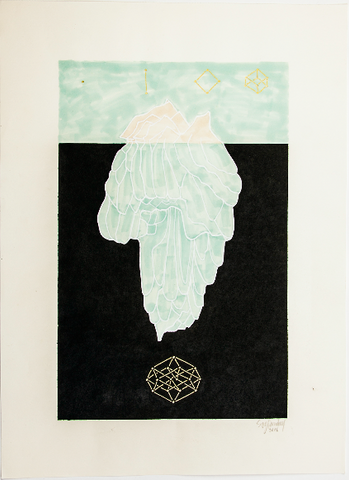
It must be an interesting thing to put your body through.
It's supposed to be like a cleanup basically. What I found interesting is that you start eating your own cells because you need to get energy from somewhere, so you start eating yourself. Nature is smart and so it picks the least needed material which are the weak cells, diseased cells‚ everything that is not vital or needs cleaning. The hardest part really is being away ten days in a secluded cabin, I don't know‚ that's messed up! (laughter). Nah it's cool.
There is something nice to be just still. To realize that it's quiet versus the intensity that city life can have.
Yeah, that's what I'm saying, density of population is very similar to a drug addiction. Alcohol is a drug, tobacco is a drug, sugar is a drug, and in the same way the city is a drug. You know sometimes you step out and go into the quiet, and then you need your hit, you need your dose. You need your dose of city, of stuff happening around you. You aren't used to life without it. What do you do when it's still? What is still life like? I think it's good to know both sides and practice a little bit of both.
Do you think travel is like that too for skaters?
It's also a drug, traveling can be a drug‚ it's a nice drug as well. Everyone likes to travel, not everybody is addicted to it, but some people have some serious addiction to that. I remember that Kenny (Reed), got quite addicted to it for a while, because at some point he was just traveling constantly. He was known for that, he was the Traveler and he just traveled and traveled, he was reading a lot of books on gypsy culture and stuff like that, traveling people. There is definitely a gypsy in him and after a while he just couldn't sit still that much, he needed to go somewhere and go some place, go somewhere, keep going.
Skateboarding is an addiction too. Not necessarily good for you on all bases you know, it's good for a lot of things and it's bad for a lot of things. And you're hooked, you're addicted and when you don't skate you're like I need my dose of skating! I remember I broke my wrist twice, two summers in a row, and I had a cast past my elbow and I went skating with my cast on. For me there was no way I was not going to skate. That's when you realize that you're addicted. You ask alcoholics and they say I can not put this bottle down, which is also very hard to do when you start drinking. Especially when you have a social life, there is always going to be beer or something and skateboarding is a bit of the same. There is always going to be skating, whether you have a cast on your arm or not you're still going to go out and skate. It's good you know, it's fun!
I'm paraphrasing badly but someone once said professionals are great and all but it is the amateurs that push the thing. Whatever that thing is.
Exactly. But the way I see it, a professional is someone who's being rewarded for what he brought as an amateur. I could also say that amateurs are pushing the thing, while professionals are helping brands that contribute to make this thing a culture, which is also very important. Skateboarding is very related to art, it's an industry that promotes art, I think that's important.
Why do you think your style changed so drastically from the cartoonish to the more realistic and cosmic?
I was getting back into drawing after quite some time and didn't really know how to do it anymore. Then I figured it was just a good exercise to just draw things around me, drawing people. So instead of inventing characters like I did when I was young, I would try to copy reality. Also I was reading less comics, my influences changed a bit. That's also a reason I guess. Whatever art you produce reflects what you have seen, what has imprinted your retina somehow. I've always been into spirituality, and I guess as I grew older my interest shifted into that a lot more, that's what I researched a lot, and so what i saw a lot. At some point I started to draw animals and found them fun to draw, and also more forgiving than a human face. Your drawing can be as shitty, but a bear looks like a bear, you can't tell the imperfections like you would on a portrait, and he'd rarely come and complain..
The animals they would see the imperfections, they would look at it and say these guys are idiots.
Yes, I mean if that bear I'm talking about would look at it, he'd be like "pfft, that doesn't look like me, my mouth isn't there, are you stupid? Look at the size of those ears. My left eye is too low‚" To us it is not as striking, you are stoked -like, alright I did a pretty good bear. So, that just came naturally, and yeah the style did change. I guess I don't really know why it changed, it just happened you know, a lot of things just happen. I think most things just happen and you understand them later. It's rarely the opposite, I wish it was that way but mainly things happen and you have to make sense out of it.
I've realized that's the way it goes for drawings, you make a drawing and the explanation for it comes after. That's what's also interesting about it because you're like: where did this drawing come from? Why am I drawing this? I don't know why I'm drawing this right now. I have this idea in my mind that I should draw this but I don't know why. So all I can do at the moment is draw it, finish the drawing and then ask myself "why did I draw this? Why did I draw it this way, what does this all mean?" That's what I think is fascinating about drawing it's a dialogue of sorts with your unconscious. The drawing appears in your unconscious and you draw it, materialize it and then you try to read what your unconscious is trying to tell you. After a while I started to see recurrences in my drawings. I drew a lot of animals and I drew a lot of geometric shapes. Why? I look around and not everybody is doing this and I don't know why I'm doing this, so I should research that and keep doing more. I realized that it's a language that you learn. You know the reoccurring objects you are drawing? They are like words of the language of your unconscious because they appear that way in your unconscious. The language of your unconscious I guess is symbolic it's not going to be in actual words it's like images of stuff that have a certain meaning for you and you have to understand that meaning.
So you do that more and you realize that you are learning, literally learning a new language. You can explore what it is trying to tell you because it is always trying to tell you something. Dreams are a very good example, every night of your life you are going to dream and there is going to be a scenario, there are going to be images, showing something to you in front of your eyes while you're sleeping. It's like your unconscious is saying, "do with it whatever you want, but I'm showing it to you.‚" If it exists that means there is a purpose for it, nothing exists without a purpose. I think. You have two eyes, they have a purpose‚ to see in a certain way. You have a nose‚ everything has a reason to be and has a purpose. So if you dream every night that means there is a purpose, your unconscious is showing something to you and it's doing it for a reason and the reason is good for you otherwise it wouldn't be here. The drawing thing is the same, the dialogue with your unconscious is interesting. The idea that you can learn your own language is pretty funny, but that's what you are doing. That goes with all kinds of creations. When you take photos your eye is always going to catch the same kind of things and you are going to take the same kind of photos, that's also directed by your unconscious. Why am I looking at this? Other people will look at something else. Someone is only going to take photos of nature, this one is only going to take photos of street people or this guy is only going to take pictures of a certain type of architecture.
Have you ever had any formal art training?
No.
Do you think you missed out on anything by not going to art school?
Not really, well, I missed out on techniques. I don't know that many techniques. School teaches you that. But then again, maybe that's not the most important. The most important is what you have to say. Or what you've seen. Whatever you produce is a summary of what you've seen and remembered. Everything that has left an imprint on your soul or, if you don't like the word soul, everything that has imprinted your eye. You've seen it enough times and it's left an imprint and you can incorporate it into the artwork that you produce. I tend to think that when you go to art school, you're going to be lead to look at the same things. I see a lot of things that look the same because people have looked at the same stuff. It's part of the system, the school is part of the system so when you're in the system you're going to see mainly that system and a certain culture that this system produces. What you are going to produce is going to be inspired at a certain level by this. You're going to incorporate all this into your work and then I guess it makes it harder for you to step out and be your own. The time that you haven't spent in art school you've seen something else, that people who have gone to art school haven't seen and you're going to incorporate that and that's going to make your artwork maybe a little bit different. Yeah you miss out on some but you gain some on the other end. You miss out on technique but maybe you gain in stuff you've seen.
I really liked the recent series that came out, the Totem series. In the past couple years it seems like they've gotten better and better. Or maybe I'm just understanding that language better, that you spoke about earlier.
Thanks. It's difficult because at first you don't know what part of the language is going to be understood. It took a long time for me to understand my own language and I'm focusing a lot of my attention onto it, so obviously, you can guess for other people it might never happen at all. For the people who see my art, it is going to be scattered, they are going to see one board here and then another one there- they don't necessarily see all the boards, or the entire series. They are not going to give so much attention to it, its just a board graphic, they'll soon forget it. So I guess it implies a lot of repetition, trying to put certain symbols and certain stuff on it so that people start to grasp what you're trying to say and I'm sure it takes a little while. And then you have to keep practicing your language so that you don't go in every direction, because that will make it even harder for people to understand.
It's funny, sometimes there are some board series that you make very quick, like there are some boards I did for next winter that I'm really stoked on and they came in really quick in one or two days I did the entire thing. It came so easy. One idea that sparks out of nowhere and boom, you draw a series in 2 days. Then the next one you can be struggling for weeks. What is this one going to be about? Then sometimes you have an idea of what you want it to be about, what you want it to mean and then you realize it's hard to make a reality out of it. It's hard to make a good looking board or series from this idea.
For example I've been wanting to make a series about fruits and vegetables because I think people need to eat them and the idea is to link them with shakras, the colors of the shakra. Because of the fact that you are eating colors, you eat their vibrations. In my logic, shakras are associated with colors, color is a vibration, the fruits and elements in life are certain colors. The vibrations of these colors are going to have an effect on you, you know green is really good for you because on the color spectrum it's in the middle. It's the middle between blue and red, if you cross blue and red light it's going to give you green. So it's the color of balance and that's why I think you're supposed to eat a lot of greens. It's good for you. But to make this idea something nice and at least semi-understandable, or desirable, well, it gets tough. Would people want to buy a board that has, I don't know, an artichoke on it? It's difficult, you know maybe I might break my teeth on that graphic. Kids don't give a shit about an artichoke on a board, I think an artichoke is beautiful. But, look at the board, is that a really strong graphic? So that's what I'm currently working on and I'm like OK how can I make this? Can I turn this idea, which is a positive and semi-educational idea and I believe in that. Trying to put positive ideas in people's minds, try to offer what I think can be learned and understood and I can incorporate that into the graphic. But mainly they have to be good graphics that people are going to buy and again, it's a razors edge. There is what you want to talk about, what you want to say and the end result is people are going to buy it or not. The skate shop has fifty different brands they can choose from and why would they choose your graphic? So the balance between the two can be hard sometimes. First to have the idea, that can be hard itself sometimes. What do I want it to talk about? Because I want everyone of them to talk about something. I guess that's the case for every artist, they want to talk about something.
As a painter you are able to paint something and have it in front of you. But when you are doing a board graphic it's all in the computer. So do you find that when you see a graphic on a board for the first time that it is different than how you wanted it to come out?
No, they usually look the same. I draw on paper, I draw everything on paper and I only use the computer for colors and layouts. Everything is drawn by hand and they always come out the way I want them to come out. They usually come out better in real life because the look of the screen print, and the actual wood, when you see the wood for real on the board, wood is beautiful in itself. It's always different and it's always beautiful. So it's always going to look a little bit different then on my mock-up, but usually better.
After you are done with this fast, what's next?
Straight after this I'm going to a film festival, the last film we made with my friend Sylvain (Robineau) is selected. Actually I have only a cameo. Its been selected in a bunch of festivals, been bought by television -aired on French television and I don't know where else. It's in this one festival this weekend so we're going to go to that. It's a festival that's mainly centered on the music, and the music in the movie was composed by our friend Matias (Elichabehere), he's done some songs for our (Magenta) videos, he's done a lot of music for Minuit videos too. He's a skater that makes music, and he's made the music for Sylvain's last two movies, and both were selected for the same festival. After that is a bit of skating then we're going on a skate trip to Dubai, then we're going back to Marseille again for a skate trip, and I'm going to have an exhibition there. Then I'm back in Paris and I have an art show there then it'll be time for another fashion week, and then another group art show in Paris.
Then I'm supposedly having two shows in the US in September, at the Escapist Skate shop in Kansas City and then at the No Comply shop in Austin, Texas. We'll see if works out, we're tight on dates. There is a lot going on.
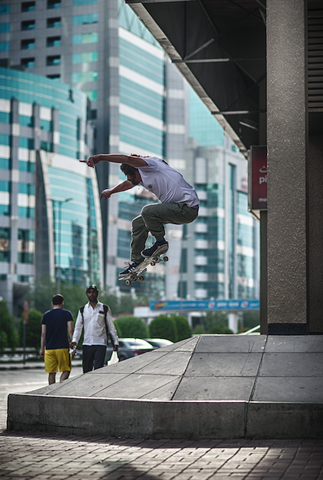
Those are great shops, their owner's skate. Elias (No Comply co-owner) used to skate for Element and still kills it.
I used to skate with him back in the day, skated with him in SF a while back. He comes to Paris quite often these days.
It trips me out that his grandfather (Hiram Bingham) was the first white person to find Machu Pichu in Peru.
Really? I didn't know that. That's amazing.
I remember Anti-Hero used a photo of Hiram on a board and Elias saw it at the DLXSF shop and it tripped him out.
So they used a photo of his grandfather not knowing it was his grandfather (laughter). That's insane, so good.
Addendum
Soy and a good portion of the Magenta team spent a month traveling from Dubai to Spain and back to France. Photo and video documentation is coming, but until then here is a taste of what went down.
Who was on the trip and where did you go?
Well, not everyone went everywhere...but altogether there was Ben, Jimmy, Zach, Leo, Glen, Vivien, Gaetan, Joffrey, Masaki, Josh Roberts, Thomas Vigne, Yensi, David Manaud, Richard Hart...We went to Dubai, then Marseille, then Valencia. For a good part of this crew it was a month long trip...
How long did you spend in those locations?
10 days in each city.
Was the heat in Dubai a big factor? Did you end up skating at night more?
Yeah Dubai was insanely hot, we usually started skating around 4-5pm, when the temperature goes down to a mere 45 degrees Celsius (113 degrees Farenheit).
Somehow I didn't mind the heat too much, it warmed up my joints..
Which place was your personal favorite?
I didn't go to Valencia because I had an exhibition in Paris, but Marseille is always dope. It's a city you always want to come back to. Good chill vibe, plenty of skate spots, downhills. Our good friends Chuck and Antoine Riviere are there. It's sick.
Was there a spot that worked for everyone, more than others? You know how on trips sometimes the location and vibe coincide and things just happen and people have fun.
A lot of them did actually, I think. It's a fun crew, and when everything around you is new, you're bound to have fun.
How grumpy was Ben?
Haha, no more than usual, so I'd say about 90% of the time. Such a genius.
Was that the longest road trip you've been on?
Well again, I wasn't on the whole thing, I was gone 20 days. I've been gone longer than that before, but this was pretty intense though, because of the heat, and also because I had two art shows a week apart. One in Marseille and one in Paris. Coming back from 10 days of skating the Dubai heat I had 48 hours to get frames, frame all my work, bubble-wrap it up, drive 10 hours down to Marseille, to then set up the show, wrap it all up again 5 days later, drive another 10 hours back to Paris, on my own, and set up the Paris show while the others were heading to Valencia. Exhausting but it was exciting, I'm glad I had the opportunity to do it.

Any memorable moments from the road you'd like to share that don't involve skating?
Well, pretty much the only time we didn't skate was the night of Josh Roberts 30th birthday, in Dubai. We ended up at this big bar/club on the beach where you basically feel you are in Miami, and defied a crew of hip hop dancers in a dance battle, which, in the eyes of the growing public, we won without shadow of a doubt. Haha. The crew was a bit pissed because we were basically just a bunch of kooks fucking around -Jimmy was actually throwing himself flat in the air and sliding on the ground uncontrollably, I'm actually surprised he didn't fuck himself up. Well, he definitely couldn't skate the next day. But he pretty much won the battle. Hahaha.
Did you take a journal with you, if so do you draw while you travel?
Not really no, I was mostly trying to skate. I intended to finish a drawing for the art show while in Dubai, but I realized it's impossible for me to concentrate enough to draw while I'm sharing a room and there's people around that I don't get to see that often. So I just skated and hung out with everyone, it was sick.
Last words or any advice for your fellow skaters?
Try to think of the constructive advice the 10-or-20-year-older-you would give the today-you, and follow it. To help you with that, try to think of the kind of advice the today-you would give the 10-years-ago-you.
If I could give an advice to the 15 year old me, I would tell him to do yoga, even just a tiny bit, but everyday, in so far as possible, because he will be 40 one day, and his desire to skate will not have changed much. I figured the 60 year old me would tell me the same, so I've started to listen.
The future is being paved today.
Thanks Isaac, and everyone at Theories.
Interview by Isaac McKay-Randozzi
0 comments